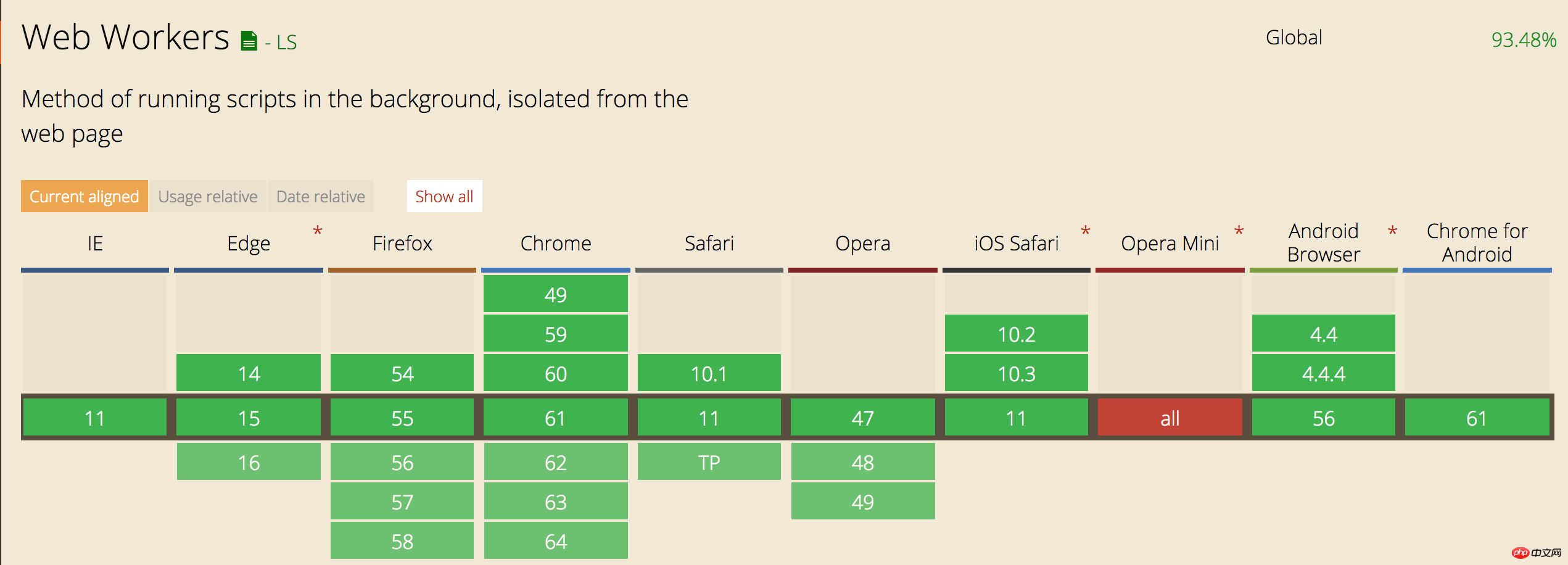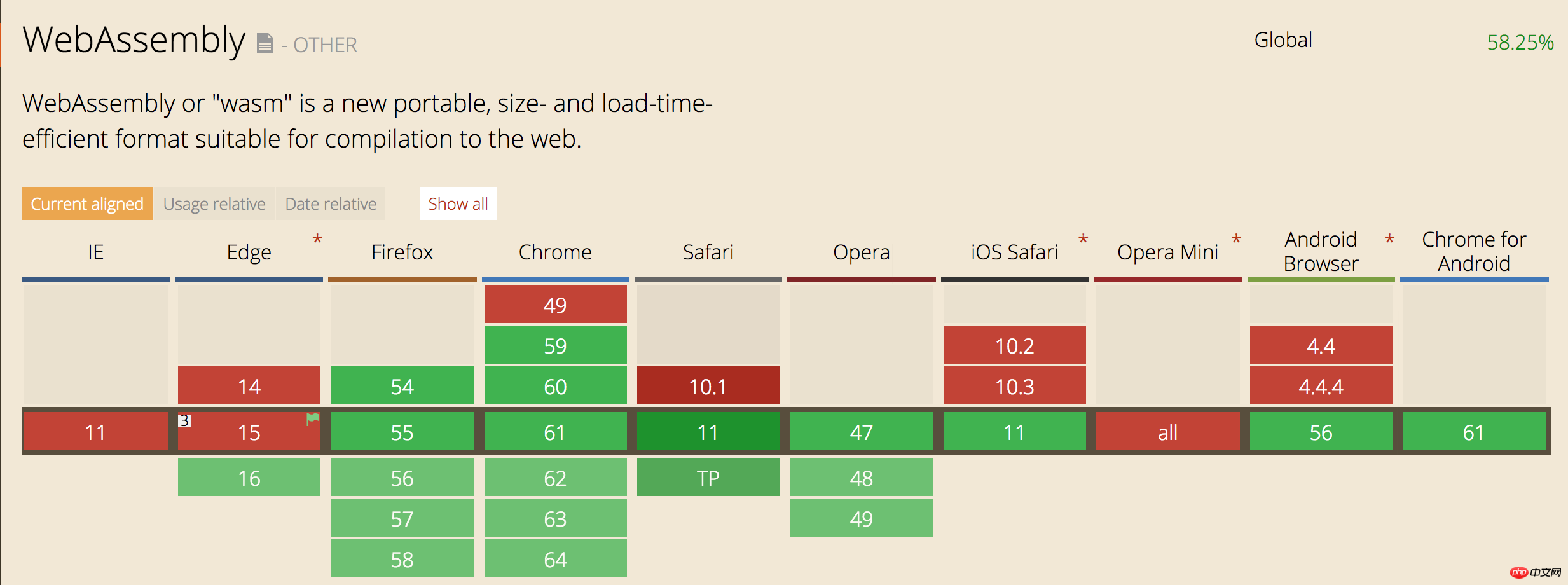
前端高性能计算之一:WebWorkers 什么是WebWorkers
简单说, WebWorkers 是一个HTML5的新API,web开发者可以通过此API在后台运行一个脚本而不阻塞UI,可以用来做需要大量计算的事情,充分利用CPU多核。
现在浏览器基本都 支持WebWorkers 了。

Parallel.js
直接使用 WebWorkers 接口还是太繁琐,好在有人已经对此作了封装: Parallel.js 。
注意 Parallel.js 可以通过node安装:
$ npm install paralleljs
不过这个是在node.js下用的,用的node的cluster模块。如果要在浏览器里使用的话, 需要直接应用js:
<script src="parallel.js"></script>
然后可以得到一个全局变量,Parallel。Parallel提供了map和reduce两个函数式编程的接口,可以非常方便的进行并发操作。
我们先来定义一下我们的问题,由于业务比较复杂,我这里把问题简化成求1-1,0000,0000的和,然后在依次减去1-1,0000,0000,答案显而易见: 0! 这样做是因为数字太大的话会有数据精度的问题,两种方法的结果会有一些差异,会让人觉得并行的方法不可靠。此问题在我的mac pro chrome61下直接简单地跑js运行的话大概是1.5s(我们实际业务问题需要15s,这里为了避免用户测试的时候把浏览器搞死,我们简化了问题)。
const N = 100000000;// 总次数1亿
// 更新自2017-10-24 16:47:00
// 代码没有任何含义,纯粹是为了模拟一个耗时计算,直接用
// for (let i = start; i <= end; i += 1) total += i;
// 有几个问题,一是代码太简单没有任何稍微复杂一点的操作,后面用C代码优化的时候会优化得很夸张,没法对比。
// 二是数据溢出问题, 我懒得处理这个问题,下面代码简单地先加起来,然后再减掉,答案显而易见为0,便于测试。
function sum(start, end) {
let total = 0;
for (let i = start; i <= end; i += 1) {
if (i % 2 == 0 || i % 3 == 1) {
total += i;
} else if (i % 5 == 0 || i % 7 == 1) {
total += i / 2;
}
}
for (let i = start; i <= end; i += 1) {
if (i % 2 == 0 || i % 3 == 1) {
total -= i;
} else if (i % 5 == 0 || i % 7 == 1) {
total -= i / 2;
}
}
return total;
}
function paraSum(N) {
const N1 = N / 10;//我们分成10分,没分分别交给一个web worker,parallel.js会根据电脑的CPU核数建立适量的workers
let p = new Parallel([1, 2, 3, 4, 5, 6, 7, 8, 9, 10])
.require(sum);
return p.map(n => sum((n - 1) * 10000000 + 1, n * 10000000))// 在parallel.js里面没法直接应用外部变量N1
.reduce(data => {
const acc = data[0];
const e = data[1];
return acc + e;
});
}
export { N, sum, paraSum }
代码比较简单,我这里说几个刚用的时候遇到的坑。
require所有需要的函数
比如在上诉代码中用到了sum,你需要提前require(sum),如果sum中由用到了另一个函数f,你还需要require(f),同样如果f中用到了g,则还需要require(g),直到你require了所有用到的定义的函数。。。。
没法require变量
我们上诉代码我本来定义了N1,但是没法用
ES6编译成ES5之后的问题以及Chrome没报错
实际项目中一开始我们用到了ES6的特性:数组解构。本来这是很简单的特性,现在大部分浏览器都已经支持了,不过我当时配置的babel会编译成ES5,所以会生成代码_slicedToArray,大家可以在线上Babel测试,然后Chrome下面始终不work,也没有任何报错信息,查了很久,后来在Firefox下打开,有报错信息:
ReferenceError: _slicedToArray is not defined
看来Chrome也不是万能的啊。。。
大家可以在 此Demo页面 测试, 提速大概在4倍左右,当然还是得看自己电脑CPU的核数。 另外我后来在同样的电脑上Firefox55.0.3(64位)测试,上诉代码居然只要190ms!!!在Safari9.1.1下也是190ms左右。。。
Refers
https://developer.mozilla.org/zh-CN/docs/Web/API/WebWorkersAPI/Usingwebworkers
https://www.html5rocks.com/en/tutorials/workers/basics/
https://parallel.js.org/
https://johnresig.com/blog/web-workers/
http://javascript.ruanyifeng.com/htmlapi/webworker.html
http://blog.teamtreehouse.com/using-web-workers-to-speed-up-your-javascript-applications
前端高性能计算之二:asm.js & webassembly
前面我们说了要解决高性能计算的两个方法,一个是并发用WebWorkers,另一个就是用更底层的静态语言。
2012年,Mozilla的工程师 Alon Zakai 在研究 LLVM 编译器时突发奇想:能不能把C/C++编译成Javascript,并且尽量达到Native代码的速度呢?于是他开发了 Emscripten 编译器,用于将C/C++代码编译成Javascript的一个子集 asm.js ,性能差不多是原生代码的50%。大家可以看看这个PPT。
之后Google开发了[Portable Native Client][PNaCI],也是一种能让浏览器运行C/C++代码的技术。 后来估计大家都觉得各搞各的不行啊,居然Google, Microsoft, Mozilla, Apple等几家大公司一起合作开发了一个面向Web的通用二进制和文本格式的项目,那就是 WebAssembly ,官网上的介绍是:
引用
WebAssembly or wasm is a new portable, size- and load-time-efficient format suitable for compilation to the web.
所以,WebAssembly应该是一个前景很好的项目。我们可以看一下 目前浏览器的支持情况 :

安装Emscripten
访问https://kripken.github.io/emscripten-site/docs/getting_started/downloads.html
1. 下载对应平台版本的SDK
2. 通过emsdk获取最新版工具
bash # Fetch the latest registry of available tools. ./emsdk update # Download and install the latest SDK tools. ./emsdk install latest # Make the "latest" SDK "active" for the current user. (writes ~/.emscripten file) ./emsdk activate latest # Activate PATH and other environment variables in the current terminal source ./emsdk_env.sh
3. 将下列添加到环境变量PATH中
~/emsdk-portable ~/emsdk-portable/clang/fastcomp/build_incoming_64/bin ~/emsdk-portable/emscripten/incoming
4. 其他
我在执行的时候碰到报错说LLVM版本不对,后来参考文档配置了LLVM_ROOT变量就好了,如果你没有遇到问题,可以忽略。
LLVM_ROOT = os.path.expanduser(os.getenv('LLVM', '/home/ubuntu/a-path/emscripten-fastcomp/build/bin'))
5. 验证是否安装好
执行emcc -v,如果安装好会出现如下信息:
emcc (Emscripten gcc/clang-like replacement + linker emulating GNU ld) 1.37.21 clang version 4.0.0 (https://github.com/kripken/emscripten-fastcomp-clang.git 974b55fd84ca447c4297fc3b00cefb6394571d18) (https://github.com/kripken/emscripten-fastcomp.git 9e4ee9a67c3b67239bd1438e31263e2e86653db5) (emscripten 1.37.21 : 1.37.21) Target: x86_64-apple-darwin15.5.0 Thread model: posix InstalledDir: /Users/magicly/emsdk-portable/clang/fastcomp/build_incoming_64/bin INFO:root:(Emscripten: Running sanity checks)
Hello, WebAssembly!
创建一个文件hello.c:
#include <stdio.h>
int main() {
printf("Hello, WebAssembly!\n");
return 0;
}
编译C/C++代码:
emcc hello.c
上述命令会生成一个a.out.js文件,我们可以直接用Node.js执行:
node a.out.js
输出:
Hello, WebAssembly!
为了让代码运行在网页里面,执行下面命令会生成hello.html和hello.js两个文件,其中hello.js和a.out.js内容是完全一样的。
emcc hello.c -o hello.html
➜ webasm-study md5 a.out.js MD5 (a.out.js) = d7397f44f817526a4d0f94bc85e46429 ➜ webasm-study md5 hello.js MD5 (hello.js) = d7397f44f817526a4d0f94bc85e46429
然后在浏览器打开hello.html,可以看到页面:;;
前面生成的代码都是asm.js,毕竟Emscripten是人家作者Alon Zakai最早用来生成asm.js的,默认输出asm.js也就不足为奇了。当然,可以通过option生成wasm,会生成三个文件:hello-wasm.html, hello-wasm.js, hello-wasm.wasm。
emcc hello.c -s WASM=1 -o hello-wasm.html
然后浏览器打开hello-wasm.html,发现报错TypeError: Failed to fetch。原因是wasm文件是通过XHR异步加载的,用file:////访问会报错,所以我们需要启一个服务器。
npm install -g serve serve .
然后访问http://localhost:5000/hello-wasm.html,就可以看到正常结果了。
调用C/C++函数
前面的Hello, WebAssembly!都是main函数直接打出来的,而我们使用WebAssembly的目的是为了高性能计算,做法多半是用C/C++实现某个函数进行耗时的计算,然后编译成wasm,暴露给js去调用。
在文件add.c中写如下代码:
#include <stdio.h>
int add(int a, int b) {
return a + b;
}
int main() {
printf("a + b: %d", add(1, 2));
return 0;
}
有两种方法可以把add方法暴露出来给js调用。
通过命令行参数暴露API
emcc -s EXPORTED_FUNCTIONS="['_add']" add.c -o add.js
注意方法名add前必须加_。 然后我们可以在Node.js里面这样使用:
// file node-add.js
const add_module = require('./add.js');
console.log(add_module.ccall('add', 'number', ['number', 'number'], [2, 3]));
执行node node-add.js会输出5。如果需要在web页面使用的话,执行:
emcc -s EXPORTED_FUNCTIONS="['_add']" add.c -o add.html
然后在生成的add.html中加入如下代码:
<button onclick="nativeAdd()">click</button>
<script type='text/javascript'>
function nativeAdd() {
const result = Module.ccall('add', 'number', ['number', 'number'], [2, 3]);
alert(result);
}
</script>
然后点击button,就可以看到执行结果了。
Module.ccall会直接调用C/C++代码的方法,更通用的场景是我们获取到一个包装过的函数,可以在js里面反复调用,这需要用Module.cwrap,具体细节可以参看 文档 。
const cAdd = add_module.cwrap('add', 'number', ['number', 'number']);
console.log(cAdd(2, 3));
console.log(cAdd(2, 4));
定义函数的时候添加EMSCRIPTEN_KEEPALIVE
添加文件add2.c。
#include <stdio.h>
#include <emscripten.h>
int EMSCRIPTEN_KEEPALIVE add(int a, int b) {
return a + b;
}
int main() {
printf("a + b: %d", add(1, 2));
return 0;
}
执行命令:
emcc add2.c -o add2.html
同样在add2.html中添加代码:
<button onclick="nativeAdd()">click</button>
<script type='text/javascript'>
function nativeAdd() {
const result = Module.ccall('add', 'number', ['number', 'number'], [2, 3]);
alert(result);
}
</script>
但是,当你点击button的时候,报错:
Assertion failed: the runtime was exited (use NO_EXIT_RUNTIME to keep it alive after main() exits)
可以通过在main()中添加emscripten_exit_with_live_runtime()解决:
#include <stdio.h>
#include <emscripten.h>
int EMSCRIPTEN_KEEPALIVE add(int a, int b) {
return a + b;
}
int main() {
printf("a + b: %d", add(1, 2));
emscripten_exit_with_live_runtime();
return 0;
}
或者也可以直接在命令行中添加-s NO_EXIT_RUNTIME=1来解决,
emcc add2.c -o add2.js -s NO_EXIT_RUNTIME=1
不过会报一个警告:
exit(0) implicitly called by end of main(), but noExitRuntime, so not exiting the runtime (you can use emscripten_force_exit, if you want to force a true shutdown)
所以建议采用第一种方法。
上述生成的代码都是asm.js,只需要在编译参数中添加-s WASM=1中就可以生成wasm,然后使用方法都一样。
用asm.js和WebAssembly执行耗时计算
前面准备工作都做完了, 现在我们来试一下用C代码来优化前一篇中提过的问题。代码很简单:
// file sum.c
#include <stdio.h>
// #include <emscripten.h>
long sum(long start, long end) {
long total = 0;
for (long i = start; i <= end; i += 3) {
total += i;
}
for (long i = start; i <= end; i += 3) {
total -= i;
}
return total;
}
int main() {
printf("sum(0, 1000000000): %ld", sum(0, 1000000000));
// emscripten_exit_with_live_runtime();
return 0;
}
注意用gcc编译的时候需要把跟emscriten相关的两行代码注释掉,否则编译不过。 我们先直接用gcc编译成native code看看代码运行多块呢?
➜ webasm-study gcc sum.c ➜ webasm-study time ./a.out sum(0, 1000000000): 0./a.out 5.70s user 0.02s system 99% cpu 5.746 total ➜ webasm-study gcc -O1 sum.c ➜ webasm-study time ./a.out sum(0, 1000000000): 0./a.out 0.00s user 0.00s system 64% cpu 0.003 total ➜ webasm-study gcc -O2 sum.c ➜ webasm-study time ./a.out sum(0, 1000000000): 0./a.out 0.00s user 0.00s system 64% cpu 0.003 total
可以看到有没有优化差别还是很大的,优化过的代码执行时间是3ms!。really?仔细想想,我for循环了10亿次啊,每次for执行大概是两次加法,两次赋值,一次比较,而我总共做了两次for循环,也就是说至少是100亿次操作,而我的mac pro是2.5 GHz Intel Core i7,所以1s应该也就执行25亿次CPU指令操作吧,怎么可能逆天到这种程度,肯定是哪里错了。想起之前看到的 一篇rust测试性能的文章 ,说rust直接在编译的时候算出了答案, 然后把结果直接写到了编译出来的代码里, 不知道gcc是不是也做了类似的事情。在知乎上 GCC中-O1 -O2 -O3 优化的原理是什么? 这篇文章里, 还真有loop-invariant code motion(LICM)针对for的优化,所以我把代码增加了一些if判断,希望能“糊弄”得了gcc的优化。
#include <stdio.h>
// #include <emscripten.h>
// long EMSCRIPTEN_KEEPALIVE sum(long start, long end) {
long sum(long start, long end) {
long total = 0;
for (long i = start; i <= end; i += 1) {
if (i % 2 == 0 || i % 3 == 1) {
total += i;
} else if (i % 5 == 0 || i % 7 == 1) {
total += i / 2;
}
}
for (long i = start; i <= end; i += 1) {
if (i % 2 == 0 || i % 3 == 1) {
total -= i;
} else if (i % 5 == 0 || i % 7 == 1) {
total -= i / 2;
}
}
return total;
}
int main() {
printf("sum(0, 1000000000): %ld", sum(0, 100000000));
// emscripten_exit_with_live_runtime();
return 0;
}
执行结果大概要正常一些了。
➜ webasm-study gcc -O2 sum.c ➜ webasm-study time ./a.out sum(0, 1000000000): 0./a.out 0.32s user 0.00s system 99% cpu 0.324 total
ok,我们来编译成asm.js了。
#include <stdio.h>
#include <emscripten.h>
long EMSCRIPTEN_KEEPALIVE sum(long start, long end) {
// long sum(long start, long end) {
long total = 0;
for (long i = start; i <= end; i += 1) {
if (i % 2 == 0 || i % 3 == 1) {
total += i;
} else if (i % 5 == 0 || i % 7 == 1) {
total += i / 2;
}
}
for (long i = start; i <= end; i += 1) {
if (i % 2 == 0 || i % 3 == 1) {
total -= i;
} else if (i % 5 == 0 || i % 7 == 1) {
total -= i / 2;
}
}
return total;
}
int main() {
printf("sum(0, 1000000000): %ld", sum(0, 100000000));
emscripten_exit_with_live_runtime();
return 0;
}
执行:
emcc sum.c -o sum.html
然后在sum.html中添加代码
<button onclick="nativeSum()">NativeSum</button>
<button onclick="jsSumCalc()">JSSum</button>
<script type='text/javascript'>
function nativeSum() {
t1 = Date.now();
const result = Module.ccall('sum', 'number', ['number', 'number'], [0, 100000000]);
t2 = Date.now();
console.log(`result: ${result}, cost time: ${t2 - t1}`);
}
</script>
<script type='text/javascript'>
function jsSum(start, end) {
let total = 0;
for (let i = start; i <= end; i += 1) {
if (i % 2 == 0 || i % 3 == 1) {
total += i;
} else if (i % 5 == 0 || i % 7 == 1) {
total += i / 2;
}
}
for (let i = start; i <= end; i += 1) {
if (i % 2 == 0 || i % 3 == 1) {
total -= i;
} else if (i % 5 == 0 || i % 7 == 1) {
total -= i / 2;
}
}
return total;
}
function jsSumCalc() {
const N = 100000000;// 总次数1亿
t1 = Date.now();
result = jsSum(0, N);
t2 = Date.now();
console.log(`result: ${result}, cost time: ${t2 - t1}`);
}
</script>
另外,我们修改成编译成WebAssembly看看效果呢?
emcc sum.c -o sum.js -s WASM=1
| Browser | webassembly | asm.js | js |
| Chrome61 | 1300ms | 600ms | 3300ms |
| Firefox55 | 600ms | 800ms | 700ms |
| Safari9.1 | 不支持 | 2800ms | 因不支持ES6我懒得改写没测试 |
感觉Firefox有点不合理啊, 默认的JS太强了吧。然后觉得webassembly也没有特别强啊,突然发现emcc编译的时候没有指定优化选项-O2。再来一次:
emcc -O2 sum.c -o sum.js # for asm.js emcc -O2 sum.c -o sum.js -s WASM=1 # for webassembly
| Browser | webassembly -O2 | asm.js -O2 | js |
| Chrome61 | 1300ms | 600ms | 3300ms |
| Firefox55 | 650ms | 630ms | 700ms |
居然没什么变化, 大失所望。号称asm.js可以达到native的50%速度么,这个倒是好像达到了。但是今年 Compiling for the Web with WebAssembly (Google I/O '17) 里说WebAssembly是1.2x slower than native code,感觉不对呢。 asm.js 还有一个好处是,它就是js,所以即使浏览器不支持,也能当成不同的js执行,只是没有加速效果。当然 WebAssembly 受到各大厂商一致推崇,作为一个新的标准,肯定前景会更好,期待会有更好的表现。
Refers
人工智能是最近两年绝对的热点,而这次人工智能的复兴,有一个很重要的原因就是计算能力的提升,主要依赖于GPU。去年Nvidia的股价飙升了几倍,市面上好点的GPU一般都买不到,因为全被做深度学习以及挖比特币的人买光了
以上内容就是实现前端高性能计算分享,希望能帮助到大家。
相关推荐:
Atas ialah kandungan terperinci 实现前端高性能计算分享. Untuk maklumat lanjut, sila ikut artikel berkaitan lain di laman web China PHP!
 Adakah python bahagian hadapan atau belakang?
Adakah python bahagian hadapan atau belakang?
 Cara melaksanakan pemesejan segera pada bahagian hadapan
Cara melaksanakan pemesejan segera pada bahagian hadapan
 Perbezaan antara front-end dan back-end
Perbezaan antara front-end dan back-end
 Pengenalan kepada hubungan antara php dan front-end
Pengenalan kepada hubungan antara php dan front-end
 Fungsi tag span
Fungsi tag span
 Penyelesaian kepada penetapan vscode antara muka Cina tidak berkuat kuasa
Penyelesaian kepada penetapan vscode antara muka Cina tidak berkuat kuasa
 Apakah peti mel antarabangsa?
Apakah peti mel antarabangsa?
 Bagaimana untuk membuka fail html
Bagaimana untuk membuka fail html




